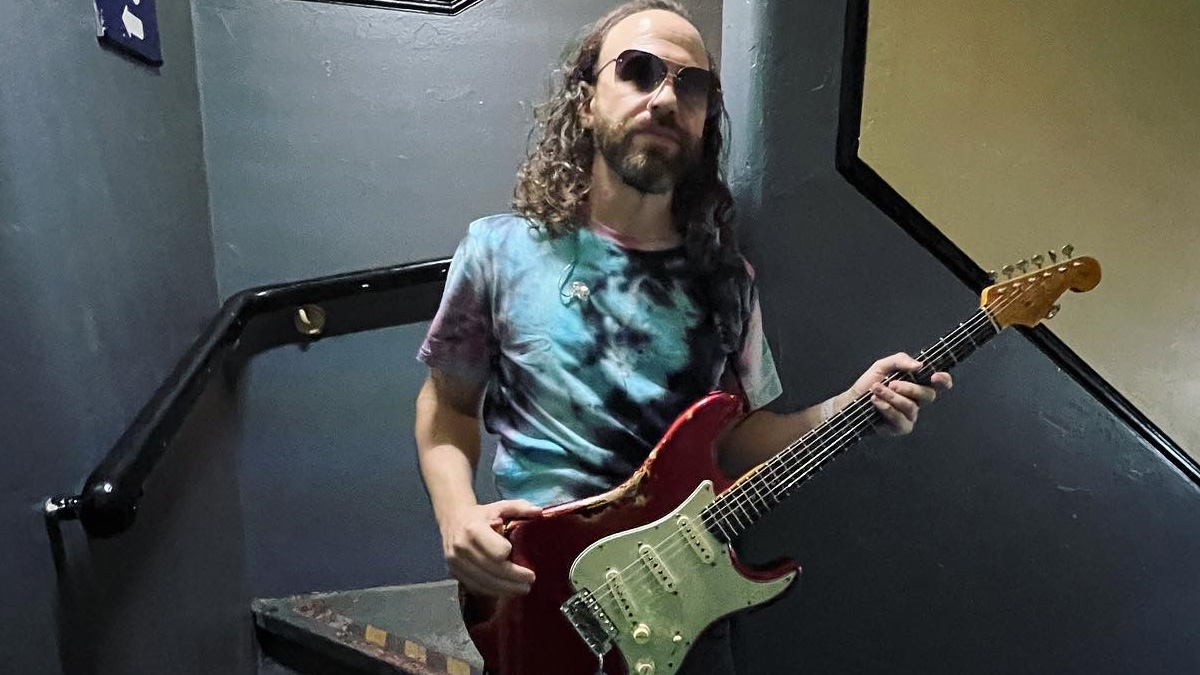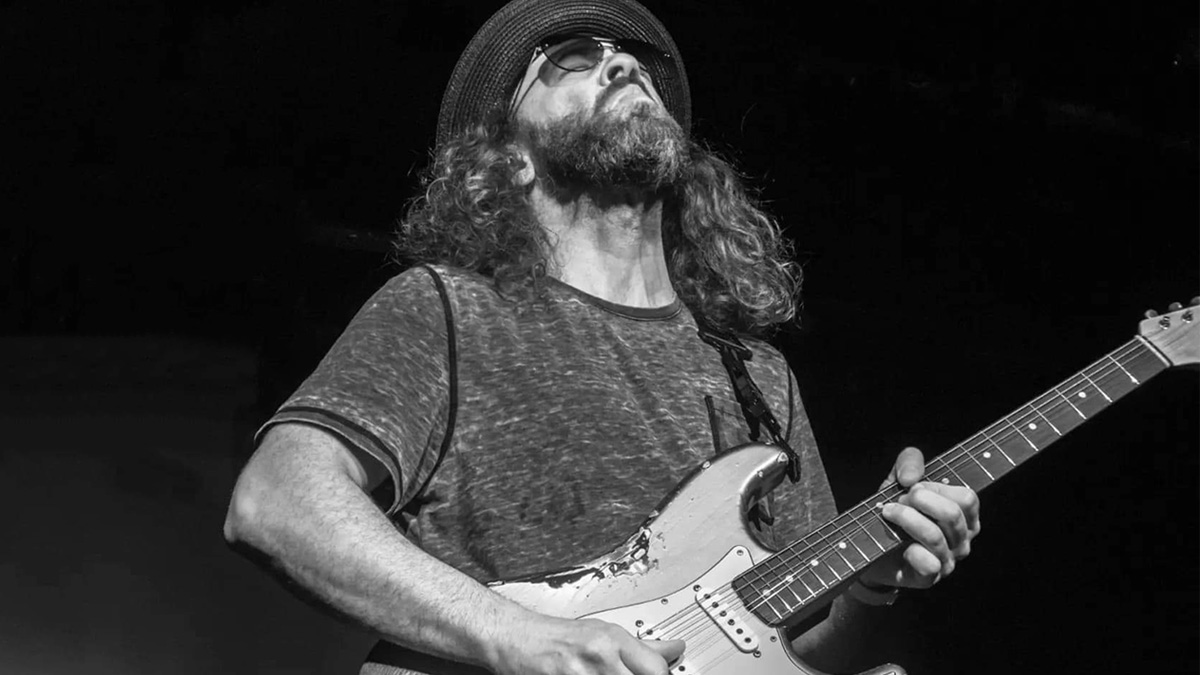Dave Weiner: “For a long time I had no desire to pick up a guitar. The guitar has always been my coping mechanism and now it seemed silly”
The much-loved guitar educator and Steve Vai’s touring guitarist on confronting grief, and knowing when to seek help and mental health support when you need it most

This article is part of Guitar World's series of interviews and features with artists addressing and raising awareness around themes of mental health, particularly as they relate to musicians.
It was, by all outward appearances, a year that any musician might envy. After a decade-long wait, Dave Weiner was finally releasing his fourth solo album, A Collection of Short Stories: Vol. 2, and preparing for rehearsals for Steve Vai’s upcoming tour. That was on the outside.
On the inside, however, the guitarist’s world was falling apart. A Collection of Short Stories: Vol. 2 was released on schedule in November 2021, but rather than celebrate, Weiner was attending his beloved father’s funeral, three days after his passing.
He could have postponed the release, but he opted to move forward, knowing that this would have been his father’s wish. Still, consumed by grief, unprepared to process the loss, he became numb toward music, guitars, and life.
“So many people lack the skills to handle life’s challenges,” he says. “I didn’t know how to handle my father’s passing and the challenges it brought minute by minute. There are things in life we can’t avoid, like loss, and yet we aren’t taught the skills to deal with them. It’s a gaping hole in our society.”
Tour rehearsals, formerly a source of joyful anticipation, now loomed ahead. He was depressed, angry, confused, anxious. He experienced uncharacteristic mood changes and outbursts. He had no desire to touch a guitar. He questioned his ability to rehearse, much less commit to a world tour. But, with support from Vai and his longtime bandmates, Weiner is now back on the road and on his way to healing.
“This has been the hardest year of my life, but I do see the light at the end of the tunnel,” he says. “Not to be too existential, but to unlock your consciousness and try to find peace and joy, you have to go through the mud.
All the latest guitar news, interviews, lessons, reviews, deals and more, direct to your inbox!
“The layers of bullshit that clouded my life have been peeled away to see things as they are, because things get real very quickly when you experience loss. Death makes you realize that everyone goes through this, and that we all need support and a few kind words.”
What signaled to you that something was wrong?
“It was everything – depression, anxiety, panic attacks, nervous breakdowns, just everything. It was all uncharted territory for me and I had no idea what I was feeling. Why I was feeling it obviously sparked from the loss of my father, but how to handle it was a different story.”
I grew up in a household that was not super-open with feelings. My parents were older, and those things weren’t discussed at home.
This was all entirely new to you? You had no previous or childhood experiences with mental health challenges?
“I guarantee that I did, but I didn’t know it. I didn't know how to identify it because I didn't grow up in that type of environment. I grew up in a household that was not super-open with feelings. My parents were older, and those things weren’t discussed at home.
“They certainly weren’t discussed at school, because our school system is horrible and doesn’t teach us about mental health and how to identify things like depression, anxiety, and stress.
“Being able to identify those things from a young age would have benefited me drastically. Instead, it was real broad poles: happy or sad, but not the details and subcategories of all our basic feelings. So I know that I felt extreme versions of everything at some point, but I lacked the knowledge to identify what was going on.”
How did it present itself this time?
“Your mind starts to spin, you’re shaking, yelling, angry, destructive, just freaking out. It happens, it happens again and again, and then you're able to kind of separate yourself from what's happening to shorten it a little bit. It keeps going that way until you gain control over it.
‘Those things still happen, but I’m better at handling them now. It’s a work in progress for sure. As much as you start trying to figure everything out, you learn that a lot of times there aren't any answers and you just have to ride the wave.”
Was this your first major loss?
“Yes. I've lost family members, but no one as close as my dad, as close as losing a parent.”

Did the people around you notice what was happening? Did anyone call it to your attention?
“Yes. It's hard to ignore somebody’s unusual tremors, the hysteria in conversations where there shouldn't be any, and one tiny thing triggering another thing. My life has been very unsettled in the last year-and-a-half, even before my dad's passing. It’s all been cumulative.
“I was excited about getting back on tour with Steve, but at the same time, something was not letting me be excited. And then, with my dad passing, the littlest thing would just trickle into all of my other issues.
Everything was unraveling. Everything was spiraling constantly. The more it happens, the more you recognize it is happening
“As often happens with people, you’re upset about something, but you’re really upset about what happened this morning or yesterday or a lingering problem, and it triggers and spiderwebs through all of the other issues.
“That’s what was happening to me. It was like, ‘Wait a minute. Why am I yelling about this when this isn't even what we're talking about?’ Everything was unraveling. Everything was spiraling constantly. The more it happens, the more you recognize it is happening, and you try to figure out how to detach, calm down, let it come and go, and try to get back on track.
“It sucks to go through this stuff, because it's distracting, not just personally, but professionally. For a long time I had no desire to pick up a guitar. The guitar has always been my coping mechanism and now it seemed silly.”
When did you lose your desire to play?
“During the last six weeks of 2021 and a lot of 2022. There wasn’t much desire to do anything with it. It wasn’t the guitar. It was life making me feel like there’s nothing I want to do or play.
“I went from improvising for hours every day and writing every day to being bored with music, over my own playing, over everything I was listening to, and over all social media and the smoke and mirrors we’re inundated with. Just over everything. Over life.”
What you’re describing is very common in both grief and depression.
“Yeah. The catalyst is the life-altering event, whatever that may be. A lot of things can put us off keel. For me, that was just one element of this equation.
I went from improvising for hours every day and writing every day to being bored with music, over my own playing, over everything I was listening to
“I think it’s a lot of things that have been a long time coming in my life, and the tipping point was the passing of my father bringing everything to light in front of my face, saying, ‘This is your life; take inventory. We’re all running out of time. You’ve got however many years left. How are you going to spend these days? What needs to be cut out? What is nonsense? What gives you purpose and enjoyment? Get rid of everything except for that.’ That’s going to take sacrifice, but hopefully it brings rewards in the long run.”

“When you start to feel such horror in the form of stress, anxiety, depression, a nervous breakdown, whatever it may be, at some point you can’t take it anymore. You get to what people call rock bottom, I guess. I don’t know if I hit that. I know I’ve been real close to it. But when you hit that floor, you can stay there or try to go back to basic self-preservation.
“Nobody wants to feel like crap all the time. It’s not fun. It’s not pleasurable. It’s exhausting. That’s when you start to rebuild. I have no expectations of anything that’s to come. I can only use what I’ve gone through as fuel in whatever capacity to move forward.”
Did you self-medicate?
“Yes. We'll just leave it at that. But yes.”
Were there thoughts of not wanting to be here anymore?
“Yes. Yes. A lot. Again, I’m here, so I don't know how to react to it, but I take that as a good sign.”
In the midst of this, you had to learn new material for the tour. How did you make yourself do it?
“That was a big part of the struggle, and it had nothing to do with Steve or his music. I just had a general disinterest in the guitar. In that mindset it seemed silly, after all of this, to be paid to execute someone’s notes in a certain way. Let’s make this clear: in that mindset. But it's not like it went away when I was standing in front of Steve and the guys and we were rehearsing this music. It was really difficult.
He is always the most encouraging, understanding, compassionate person, and he gave me the strength through his understanding
“I had to convince myself to do the tour. I had to get myself onboard, and I talked to Steve about what life has been doing to me right now. To be clear, I never look at myself as a victim. I look at it as everyone goes through this stuff, right now it’s my turn, so let’s get on the ride. I don’t know how long the ride is going to be. I know it’s going to be bumpy. But everyone’s got to go through this stuff, so now is my time to do it, and I know I’m going to come out on the other side.

“But feeling that disinterest – it’s not good. Coworkers don’t want someone standing there glazed over, and the employer doesn’t want somebody who’s miserable. In the past, I always couldn’t wait to learn new material. I couldn't wait to get into rehearsals and be with the guys. I couldn’t wait to get on tour. This time has been different.
“I had discussions with Steve about not doing the tour. He is always the most encouraging, understanding, compassionate person, and he gave me the strength through his understanding. Steve said, ‘Okay. Whatever it is, we’ll figure it out.’ When you've got somebody supportive like that, it gives you the strength and encouragement to feel like you can go into it with this very different mentality.”
What a great boss he is. So many people would have shown you the door and simply hired someone else.
“Exactly. I said to Steve, ‘I 100 per cent understand if that’s your decision.’ I’m not trying to paint myself to be more extreme than I am, but I’ve got a bit of drama happening right now. I’m handling it, I’m evolving through it, I’m learning from it, I’m gaining experience from it. The only way to go through life is through evolution, because it’s never going to stop.
“So here I am. I’m showing up at the door with baggage this time. But again, the support system around me has allowed me to do that, to give this a try, and to see if it's okay, because Steve knows I want to be here. Of course I want to be here. I want to be with my touring family of 20-plus years, and that is because of Steve being so understanding, and everybody else involved as well.”
Your bandmates are aware of what you’re going through?
“Oh yeah. I have been very open and honest and frank, because again, one of the things I've learned in recent years is that it’s not about shame or having any filters. It’s about being real. Part of that is being able to say, ‘This is who I am, and this is how I’m feeling.’ I do not apologize for it.
“I don't care how it makes me look, because it’s not permanent. Life isn’t permanent. Every day is dynamic. To put a label on someone for how they’re feeling in a snapshot of their existence is absurd. I know it happens, but hopefully, with what we’re discussing here, people can gain some understanding.
“If someone is uncomfortable with your open and honest communication, that’s their problem, not yours. I’m not apologizing for my honesty, because I know how it makes me feel. As cliche as it sounds, telling your story means living your truest existence, connecting what’s inside with what’s outside, and surrounding yourself with understanding and compassionate people.

“That’s the only life I will live anymore. It’s about strengthening my connections with people who are in tune with that, versus harboring relationships that don't serve any good towards that open and honest existence.”
“One of the best things in life is just being yourself. Judgment is nonsense. Only inept people judge others. If we surround ourselves with the nonjudgmental, the compassionate, the understanding, it’s an extra level of freedom, and that is one of the keys to a full life and good mental health.”
We can’t ignore these feelings in ourselves or in other people. We have to identify them. We need to have these conversations within families, with friends, in schools
We are seeing more emphasis on mental health, but the stigma and stereotypes remain. Do you have some thoughts to share with readers who are struggling or who know someone who is struggling?
“I’m no expert on any level. I can only speak about what I’ve been through and what I’m still living with. I think it's about identification, and not suppressing those feelings or sweeping them under the rug, because then it just festers. We can’t ignore these feelings in ourselves or in other people. We have to identify them. We need to have these conversations within families, with friends, in schools, wherever it is, because these things are not going to go away.
“We need basic awareness, otherwise, people who are struggling … it’s like being on a tightrope for life. We need more understanding, more balance, and we need to know how to identify the signs. We need to have that dialog. That’s the first step. With help, skill sets, and proactivity, we can find the fuel to get through it.”
Resources
Alison Richter is a seasoned journalist who interviews musicians, producers, engineers, and other industry professionals, and covers mental health issues for GuitarWorld.com. Writing credits include a wide range of publications, including GuitarWorld.com, MusicRadar.com, Bass Player, TNAG Connoisseur, Reverb, Music Industry News, Acoustic, Drummer, Guitar.com, Gearphoria, She Shreds, Guitar Girl, and Collectible Guitar.
